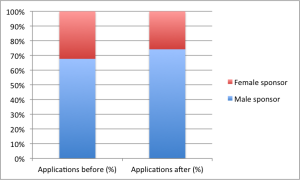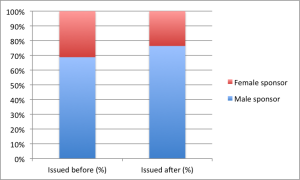A new Freedom of Information request has revealed that British women have been affected disproportionately compared against men by new minimum income rules for spouse and partner applications. There has been a 20% drop in the female-sponsored proportion of applications made, which suggests that women have been disproportionately put off applying for spouses to join them under the new regime. Of the applications that were made there has then been a further 23% drop in the female-sponsored proportion of successful applications in which a visa was subsequently issued.
The new rules were brought into force on 9 July 2012. The minimum income requirement for spouses and partners was increased dramatically to a hard threshold of at least £18,600, which has to be earned by the British-based spouse. Income from the foreign spouse was excluded for the first time and strict documentary and procedural requirements were also introduced, making it hard for the self-employed or even those with considerable personal wealth to succeed. Previously a lower and more flexible threshold of a minimum income equivalent to at least welfare benefit levels and without recourse to public funds was required, and the source of the income was not specified; income could be from either spouse or partner or even from family and friends. Family life campaigners and immigration lawyers warned that women would be disproportionately affected by the rule change because women on average continue to experience lower incomes than men. These predictions have, unfortunately, proven accurate.
Even before 9 July 2012 applications made with a female sponsoring a male were in the minority at 32.3% of the total. The 9 July 2012 changes have exaggerated that disparity and the percentage has decreased to 25.2%, a 20% change.

Before the rule change 31% of visas issued were issued in female sponsored applications. After the rule change that proportion dropped to 24%, a 23% change.

The proportion of visa refusals of female-sponsored applications also dropped, an initially surprising outcome given the effect on visas issued. The drop in the number of female-sponsored applications complicates the significance of this statistic, though.
Information on the number and gender of applicants and the number of grants and refusals of spouse visas for the six months before and after the immigration rule changes on 9 July 2012 were provided in the Freedom of Information request. The information included spouses and civil partners, but the number of civil partnership visas issued is understood to be very low indeed. It is therefore assumed for the purposes of this blog post that where the applicant or the person granted or refused the visa was male, the sponsor based in the UK was female. A simple spreadsheet showing the basic calculations on which this blog post is based is available here.




6 responses
The High Court (in Birmingham) heard the challenge to the new family migration rules, namely the £18,600 income threshold (MM and Others v Secretary of State for the Home Department) on 5 February – 9 February 2013. So far result is awaited.
I won an appeal at Taylor House on appendix Fm, and FM-SE in which the new rules were largely disregarded by the judge. We certainly did not have the mandatory evidence of income in the format required by SE. Despite this the Appeal was allowed under the rules. The decision was highly appealable with a number of clear legal errors and failures to adequately explain the decision. The Respondent has chosen not to appeal which begs the question of whether there is any stomach for a real fight over the provisions or even an informal acknowledgement that there are real flaws in them.
Just revisiting my comment above the Entry Clearance Officers have now come back and requested missing mandatory documents rather than implementing the decision which is a real concern particularly as those documents do not demonstrate compliance with the strict letter of the law (for legitimate reasons). Seems like there are no easy ways through.